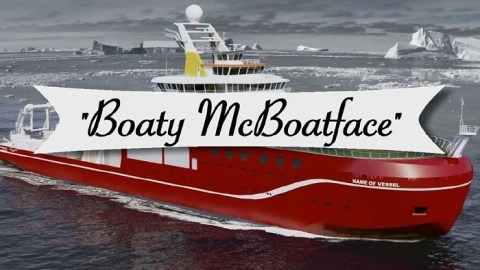Why Boaty McBoatface Is the Best Thing to Happen to Science in a Long Time

Update: this boat has been named for Sir David Attenborough, but one of its sub-sea vehicles has been named Boaty McBoatface in honor of the public’s suggestion. This ship is being built right now in the UK and will set sail in 2019.
Scientists are usually not great at engaging the public in their work. If they allow any sort of public input, it’s usually a dry announcement in a newspaper about showing up to share an opinion between 2 and 4 pm on a Tuesday. Even then, if any public shows up, their input seldom has any lasting effect on the final project. Who would do that? Why would they do that? There must be a better way to involve the general public in science.
Thankfully there is – and its name is Boaty McBoatface.
ICYMI, Boaty McBoatface was selected as the name of a new polar research ship commissioned by the UK’s Natural Environment Research Council (NERC). The ship “will provide the UK with the most advanced floating research fleet in the world and will help put the UK at the forefront of ocean research for years to come,” according to the site. It’s a highly advanced ship designed to do a lot important climate-related research, as detailed in this video:
In order to drum up interest in the project, NERC asked the internet to name the ship:
Credit: Twitter
Julia Maddock is NERC’s Acting Associate Director for Communications & Engagement. Confirmation from her is as official as you can get — and she’s excited. Because the internet did get involved. Enormously. In a way that’s never happened for any other science-related project in recent memory.
The internet suggested all kinds of names for the Royal Research Ship (RRS), from Arctic explorers (RRS Henry Worsley) and renowed naturalists (RRS David Attenborough) to a 16-month old girl with terminal cancer (RRS Poppy-Mai). But the winner, in a landslide, was a silly name: Boaty McBoatface. A name so silly it seemed like a joke — which it was, according to suggester and BBC commentator James Hand. Yet his jokey suggestion spurred far more interest in NERC’s project than they could have ever hoped for. It grabbed the attention of the internet and earned 124,109 thousands votes.
Boaty McBoatface even inspired other silly names in the NERC poll. Standouts include the RRS It’s Bloody Cold Here, Boatimus Prime, I Like Big Boats & I Cannot Lie, Science!!!, Big Metal Floating Thingy-Thing, and Clifford the Big Red Boat. There are even other takes on Boaty McBoatface as backup options, like Boaty McBoatface The Return, Boaty O’BoatFace, and Captain Boaty McBoatface. The internet seemed to trip over itself trying to one-up the joke.
Additional suggestions from the poll. Credit: NERC
But with all of that jokiness, why did Boaty McBoatface win? The best answer anyone could come up with belongs to Slate’s Katy Waldman. She wrote a fantastic roundup of the X McX naming trend and its long history of public interest. The internet embraced the trend in 2001, she writes, citing the work of lexicographer Ben Zimmer:
The first [Usenet] appearance of Hottie McHotterson (on rec.games.video.sony),” Zimmer writes, beat out “Fatty McFatterson, Stiffy McStifferson, Drinky McDrinkerson, Jewy McJewerson, etc.” Zimmer also notes a cornucopia of deprecative McNicknames for George W. Bush, including “Chimpy McBunnypants,” “Drinky McCokeSpoon,” and “Smirky McWarHardon.”
Redditor Problem119V-0800 offers an additional perspective as to why Boaty is so beloved in this Reddit thread devoted to the topic: “It’s funny because “Boaty McBoatface” is such an innocently whimsical name. The internet has ruined me and I expect all polls to end up with some 4chan-esque “Hitler McRapejoke” name.” Boaty seems to be the best of everything the internet loves — a fantastically silly response to a dead serious question in a sarcastically joking format. There is nothing about the name to not love. Even Hand admits that:
Credit: Twitter
All that said, and as perfect as Boaty McBoatface is, it may never grace the research vessel. Universities and Science Minister Jo Johnson called the name “unsuitable.” Former head of the Navy Admiral Lord West dismissed the name, saying: “It’s the typical thing of Brits going mad, normally silly season.” Even NERC reminded the people the final decision would be made by a panel, not by the number of votes.
What they’re all forgetting here, and what Culture Minister Ed Vaizey said in response to Johnson’s condemnation, is to “respect the will of the people.” Scientists asked the public to give a damn about a giant boat that will be stationed on the other side of the world. They did. They gave so much of a damn that they named it. They gave it the silliest possible name that could think of, one that would endear it to them and give it a longer life in public memory.
That’s a miracle in the science world.
At the end of the day, the amount of public trust NERC has built with Boaty McBoatface shouldn’t be taken lightly. They have two choices: they can either name the boat and accept the consequences of allowing the public a say in their project, or choose another name and kill public interest in the project. It’s a clear choice, and it’s the same choice of any scientist who opens their research to the public. By welcoming the public into the project, they become part of the project, plain and simple. Yes, it can be silly, as Boaty McBoatface has demonstrated, but it’s also allowed NERC’s project to spread farther than they could have hoped. It even changed the real, non-science world:
Credit: Twitter
Do the right thing, NERC. Keep Boaty McBoatface and set an amazing precedent for science. Or should I say Science!!!





